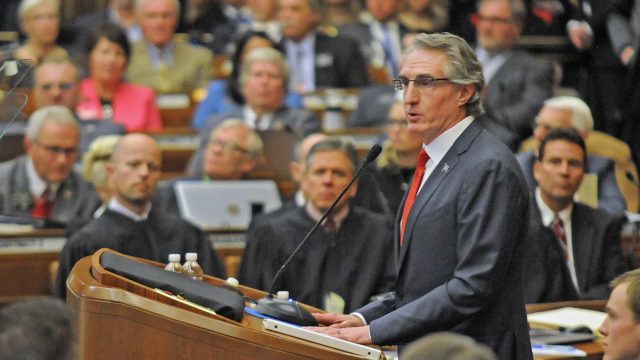Legislature Opts to Sue Governor Doug Burgum Over Vetoes

TOM STROMME.Tribune Governor Doug Burgum opened North Dakota's 65th legislative assembly on Tuesday afternoon in front of a joint session of the legislature where he delivered the State of the State address. Gov. Burgum touched on a number of topics in the address but a continuing theme was lifelong education. "Learning begins with humility. Everyone has something to teach us," he said.
A meeting of the Legislative Management Committee today voted to proceed with litigation against Governor Doug Burgum over vetoes issued earlier this year, though there will be more meetings and votes before anything gets filed.
“We need to make a statement that the governor was out of bounds on this,” Senate Majority Leader Rich Wardner told the meeting.
“We’re the only ones who can spend money, we’re the only ones who can pass laws,” House Majority Leader Al Carlson said.
The case will go directly to the state Supreme Court.
Attorney General Wayne Stenehjem provided the legislative majority leaders with an opinion on the legality of the vetoes earlier this week. He found that some of the vetoes were legal while others weren’t.
His full opinion is here.
If you need to catch up on this issue, below is a document prepared by Legislative Council and shared with me by a lawmaker. It’s a summary of the vetoes issued by Burgum as well as Council’s analysis of the legality of each one.
Here also is a summary of Legislative Council’s case against the vetoes which was written up back in May. I’m guessing the suit filed on behalf of the Legislature will follow these arguments pretty closely.
I think the legislators have a good case.
Our state constitution gives the governor two tiers of veto authority.
He can reject any given bill outright. With appropriation bills he can also exercise a line item veto. Which is to say that he can remove parts of the bill while leaving the rest of it to become law.
There is a limit to that latter authority created by the North Dakota Supreme Court in a 1979 case called Link v. Olson.
That case involved former Governor Art Link vetoing a portion of an appropriation bill which created a new executive branch office under the Lt. Governor, then using an executive order to move the duties of that new office to his own office. He funded that move with the appropriation provided by the Legislature for the original office.
Opponents of this move argued that Link hadn’t vetoed the legislation but had rather altered it.
Altering the law, for those of you up on your civics, is what the lawmakers do. The executive branch cannot legislate.
Link lost the case. The governor “may not veto conditions or restrictions on appropriations without vetoing the appropriation itself,” the ND Supreme Court ruled.
That’s an important restriction to recognize. Otherwise governors would be left with the authority to veto all legislative intent in appropriations bills and use the money for whatever they want.
[scribd id=351935961 key=key-dMb0P7Uc1a6CFVAWJICD mode=scroll]




